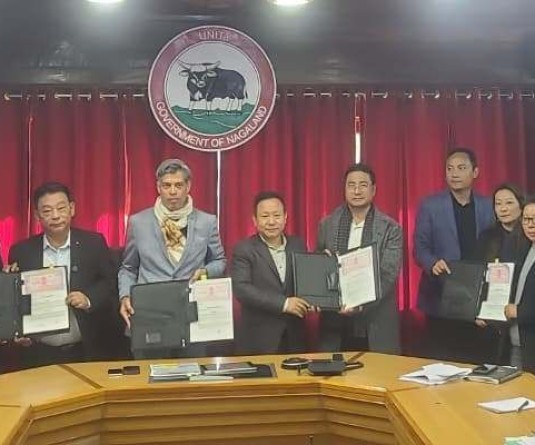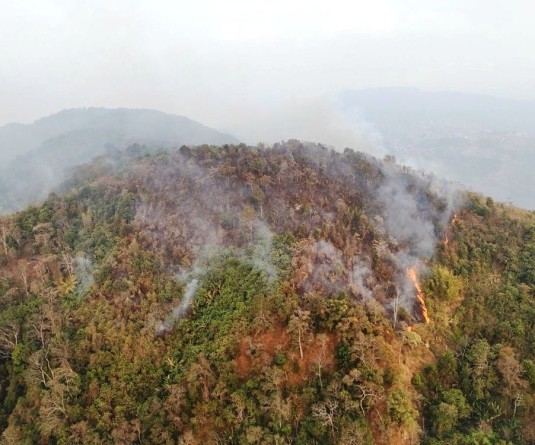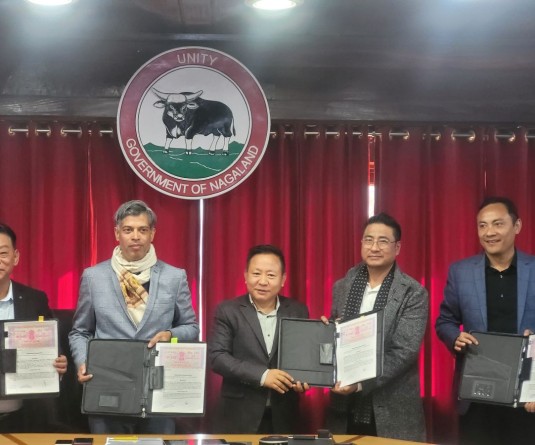
Kohima ADC Asangla Imti handing over the bicycle to police personnel in Kohima on February 3. (Morung Photo)
Kohima, February 3: For the first of its kind in Nagaland, the Kohima DEF through its traffic driving school today launched bicycles for traffic control and police station at a function held at SP office, Kohima.
Kohima DEF launches bicycles
for traffic control and police station
for traffic control and police station
Kohima ADC Asangla Imti in her address acknowledged DEF Kohima for launching traffic-driving school and hoped that it will motivate other districts to take up similar job in the coming days. Stating that the drivers, vehicle users and traffic personnel would gain a lot of information pertaining to code of traffic in this three-day long programme, she called upon them to have sincerity and determination. Later, Asangla handed over 15 bicycles to traffic control and police station.
Kohima SP Rothihu Tetseo said the DEF Kohima has initiated Traffic Driving School, the first of its kind in Nagaland, wherein it would impart the basic information and acts relating to traffic during three-day long programme. He said the traffic driving school will not be sort of running regular class but it would organize seminar/workshop from time to time where the same was communicated at the Kohima DPDB. Tetseo also sought support and cooperation from trucks, mini bus and taxi unions and at the same time called upon them to collectively address the traffic problem in the state capital.
Kohima DTO Lovikali in her address called upon each and every individual to come forward and exhibit a collective responsibility for a smooth vehicular movement in the state capital. Also talking about frequent traffic jam in Kohima, she stressed on the need to follow the traffic rules.
Deputy SP (T) Melite Kapfo said the use of mountain bicycles as police tools began in 1987 in Seattle. On a bicycle, police personnel is much more approachable than in a car and can help in building new contacts and trust from the citizens. “This allows police personnel to be proactive in fighting crime rather than reactive. Bicycles patrol police can be much more aware of concerns before they turn into problem,” Kapfo said. He added that bicycle patrols are good community policing tools. It is also very inexpensive when compared to the costs of maintaining cars and motorcycles. Through it, police personnel are more visible to and approachable by the community. Bicycles are environment friendly and cost little to maintain.
Earlier, the function was chaired by SDPO Shouka Kakheto. On day one, participants were imparted on Motor Vehicle Act- driving license, registration, insurance, permit, countersigned, fitness certificate, pollution certificate, re-registration, over loading, road obstruction, HSRP, tinted glass, number plate, VIP red light, RTA, power of police on duty, helmet, drunken driving, seat belt and causes of accident locally, bureaucratic paper process for driving license, permit, regulation, fitness, pollution, registration, tax payment, rules of road act and medical basic first aid during vehicle accident.
On day 2 (February 4), PWD officials will enlighten road construction and cost of building roads, life of the metalled road, optimum care for the metalled road, penal provisions of the National Highway Act. Dr. John, RMO will talk on health precautions before and during journey, medical reasons for certain drivers not to drive (Color blindness, chronic heart patient, chronic nerve complication, chronic diabetics, epilepsy etc, drunken driving, STDs. Resource person from tourism department will brief cleanliness of vehicle, seating capacity, vehicle hire meaning, forgotten baggage/items of passenger or tourist, smoking, chewing of pan and tobacco, throwing or disposal of water while on the journey, personal hygiene of drivers and etiquettes of drivers.
SDPO Kohima will highlight Cr. P.C, IPC, evidence act, consequence of other laws (NLTP, NSA, NDPS etc), for the driver and vehicle when used for the commission of crime or involved in a criminal case as a victim, minor acts/local laws and administrative orders.






